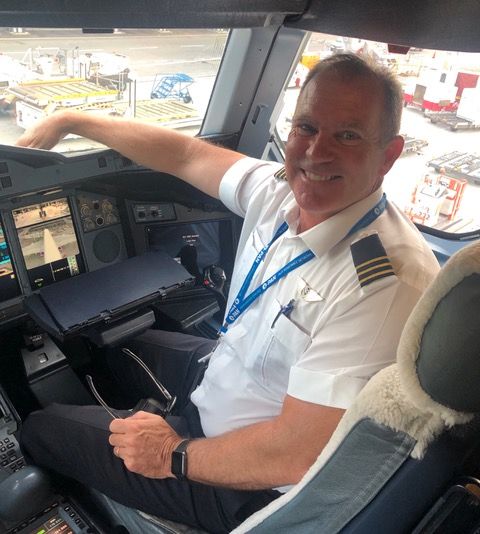Pilot Stories
An essential and core component of the HIMs Program is “Peer Support” from those that have not only been in a similar situation but have since made the difficult dicision to ask for and get assistance to overcome the challenges of addictive behaviours and are either currently participating in recovery programs or have successfully completed programs and are commited to sharing their experiences and extending a supportive hand to others.

Andrew O'Meally
Like most of us, my flying days before Qantas were adventurous and sociable ones, living and working in remote areas where drinking heavily was the norm. Some of my time was spent in Darwin and Thursday Island, however the majority was in PNG. There, I ended up running a charter business in partnership with the local publican, operating two single engine Cessna 206s.
After a few lucky escapes, both on the ground and in the air, I decided to move back to Australia where I got a job in the desert flying workers between civilisation and the gas fields. Shortly after I started, I was promoted on to my first jet and based in Cairns. I thought I was in heaven.
A couple years later, I started with Qantas, where I have been for 23 years. Of those 23, the last 18 I have been sober.
Alcohol has affected my life since I was 14. However, a good place to start the story of my drinking -flying relationship is when I was given my start date with the airline.
The day I found out I was accepted into Qantas, I stopped drinking, being determined to do well. I considered it unlikely that fate would present me with this kind of opportunity again.
Even though starting was an exciting time, I found the early days of working for such an organisation overwhelming.
Shortly after getting checked out, I was given a London trip via Bangkok. There, on the first night’s arrival at check in, the Captain gave the First Officer and myself a time to meet back in the lobby that I cannot recall, but at a guess it would have been around six o’clock. As soon as we walked into the hotel bar, the Captain went to the counter and came back with three beers. This was a moment I had been dreading. How was I going to break the news that I was going to go against tradition and not have a few beers with the crew?
Even though I had rehearsed this moment in my mind hundreds of times, I was still not sure what I was going to say. “No thanks, I don’t drink”. You know those times in your life when you feel that it won’t turn out as bad as you think? Well this wasn’t one of them. He looked at me intensely; “Andrew, you have got to learn to relax, now have a f,,ing beer!” and slid a glass across the table and under my nose. F…k.
So, there I was. I thought my dream job that had become a reality was on the line if I didn’t at least fit in socially. I lacked confidence in my flying abilities and level of intellect – classic Imposter Syndrome. So off I went again on a downward spiral, with the exception of a couple of brief abstinences, drinking heavily for some time.
Fast forward a few years. My wife is six months pregnant in Australia and I am waking up in Paris after a night that would have made the movie ‘The Hangover’ look like a Disney production. As the parts of the night I could remember started coming back to me, I started feeling embarrassed, guilty and ashamed. I felt so physically ill that I could not draw the curtains and view one of the most beautiful cities on earth.
I was soon to start my First Officer training on the 737 which would finish around the same time as my son’s birth, so I took this as a good opportunity to have a break. This time I was not going to say never again; I was sick of breaking this promise to myself.
Within days of being checked out on the 737, I watched my son come into the world, rushed back home, grabbed the bottle of champagne that I had put in the fridge days earlier and back to the hospital to celebrate. I looked at my son and then my wife and decided, to leave it a little while longer. I knew that if I continued my previous lifestyle, my son would, in time, likely consider me a drunken loser, have little respect for me or not even consider me at all, as my wife had been threatening to leave as a result of my appalling behaviour.
I feel fortunate, as the stars seemed aligned for me around that time, providing me with favourable conditions that increased the likelihood of maintaining sobriety. These included becoming a father, changing to shorthaul and moving away from my drinking companions. My wife, who did enjoy a drink but was not addicted, decided to stop in support of me. I didn’t ask her to, and she didn’t tell me she would – she just did and, like me hasn’t had a drink in the last 18 or so years.
Even though it has been years since I’ve had a drink, well before the first iPhone came on the market, I still occasionally feel a little awkward when meeting up for dinner on a slip. Once it’s out there that I don’t drink I can relax and so can everyone else. I often get the question “why don’t you drink?”. The depth of explanation depends on the audience. While I am a social person I don’t go out on every occasion, if I get the sense that it is going to be a lot of drinking and maybe some eating, I’ll usually pass on the invitation. I don’t lecture drinkers on the ‘evils of alcohol’ or how perfect my life is because it’s not. Even though there is less drama in my life now that I am sober, the world still finds ways to challenge me, but it is so much easier to deal with problems with a clear mind.
I have replaced drama with growth. I am confident that the positive experiences gained over the last 18 years are because I’ve altered the way I live. Some of the highlights are: getting a Master’s degree, (I barely got through my last year of school), being seconded to the airline’s safety department as an Air Safety Investigator and paddling surf ski races all over the world, including Molokai, Hawaii. I am still married, and my son tells me that he loves me every day.
After so many years of successfully being sober, I am starting to give back and contribute to healing those suffering from substance abuse. This help is in the form of guidance to those who ask for it. I am now spending time at Uni gaining knowledge in the area of alcohol and other drug rehab, so I’ll be equipped with more tools to assist in this recovery process. Similar to a flying career, I have got my ‘hours up’ and working through the subjects.
If you enjoy going out for a drink and it doesn’t affect your life in a negative way, that’s great. If, however, you feel that alcohol or other drugs is compromising your happiness, I want you to know that you do have options and support is available. AIPA welfare can offer guidance on where to find support as can The Pilot Assistance Network – PAN. The help is no longer a one size fits all, as there are some great programmes at hand. I felt alone and isolated for a long time but now I feel there is more understanding out there – I would not have felt comfortable in sharing this story publicly a few years ago.
If you feel that it is time to wind up your relationship with alcohol or other drugs, you will be showing strength of character, not weakness. Living substance-free has provided me growth and challenge. It is more than an existence but an amazing life that I am grateful for.

